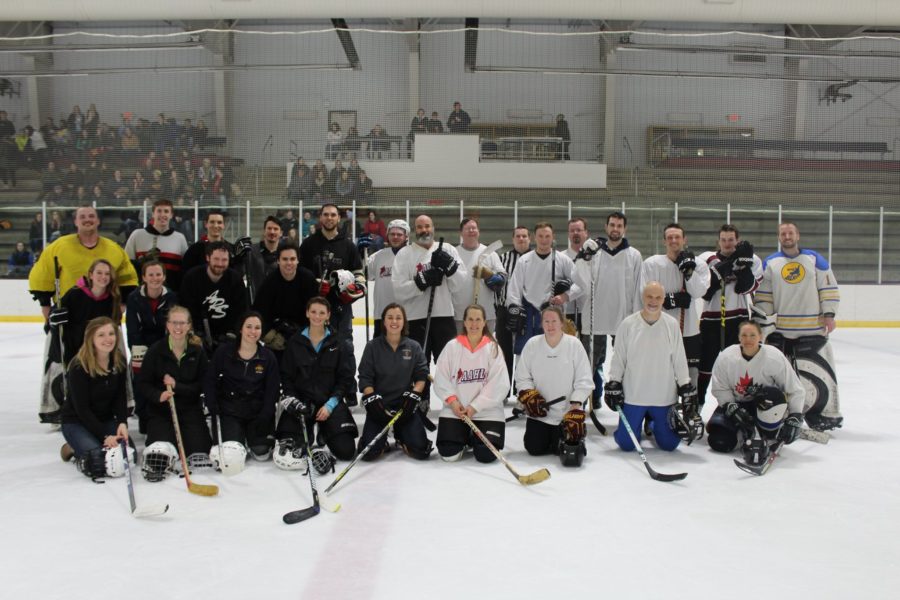How mental health and wellness affects Vet Med students, what is being done about it
Courtesy of Rebecca Hilderbrand
The Recreation and Stress Relief club in the College of Vet Med at their annual student vs. faculty hockey game.
March 7, 2018
College is tough across the board, but due to taxing hours, high-intensity situations and lots of hard work, veterinary medicine students stick out in regards to school and work-related stress.
Mental health and wellness is a topic of concern within the Iowa State College of Veterinary Medicine that faculty and students are working to address.
Additionally, experts can agree that the state of Iowa is in the midst of a mental health crisis itself.
Peggy Huppert, executive director of the National Alliance on Mental Illness of Iowa, said the state of Iowa ranks last in the country for mental health beds. Iowa’s lack of mental health care has a direct affect on students in the state by creating a lack of self-help resources around them.
“Much like other parts of Iowa State and across Iowa, we [the college] are working to address some mental health and wellness issues,” said Patrick Halbur, interim dean of the college.
Vet Med students may be at a higher, field-specific risk to the Iowa mental health crisis.
According to the American Veterinary Medical Society’s website, results from the first mental health survey of U.S. veterinarians show that they are more likely to suffer from psychiatric disorders, bouts of depression and suicidal thoughts than the U.S. adult population.
The website explains that this data suggests that nearly one in 10 U.S. veterinarians might experience psychological distress, and more than one in six might have contemplated suicide since graduation. This is a noticeable phenomenon, but it is not only relevant post graduation.
“Vet school can get very busy and be highly stressful,” said Haley Holbrook, a Vet Med student. “Students need to take time to care for themselves and do something other than vet school, or it can take over all aspects of their life.”
Holbrook said that she believes many people in the veterinary profession are well aware of the struggles that students are facing, and she has been seeing more efforts made to help students.
In an attempt to find a solution to the problem that is affecting Iowa residents and students, Halbur said he and the rest of the college have been working closely with the Division of Student Affairs’ Senior Vice President Martino Harmon to bring counseling services on site at the college. Iowa State currently offers these services on main campus, but not on site at the College of Veterinary Medicine.
Vet Med students have taken part in the effort, as well. One club in particular, Recreation and Stress Relief (RSR), which is a branch of the Student American Veterinary Medical Association, provides opportunities for students to take their minds off of the stress of everyday life.
RSR provides recreational activities such as yoga, zumba, cookie decorating, a “Welcome Back BBQ” and flag football competition.
The club has also revived the Vet Med talent show, a tradition that fell through the cracks, and have implemented “recess tubs” around the college that are full of frisbees, balls and jump ropes that are always available for student use.
“I think we [RSR] have provided so many ways for students to take their minds off of classes and relax,” said Rebecca Hilderbrand, the club’s treasurer.
“We wanted to make sure there was something for everyone. Students at the Vet Med school get very caught up in school work and clubs,” Hilderbrand said. “Our events give them a reason to leave their study nooks and enjoy classmates in a different setting.”
Student participation in RSR varies on the event the club is hosting. Hilderbrand said that their larger events can attract hundreds of students and their families, but overall, they are just focused on creating an opportunity for students to participate when they have time or need a break.







